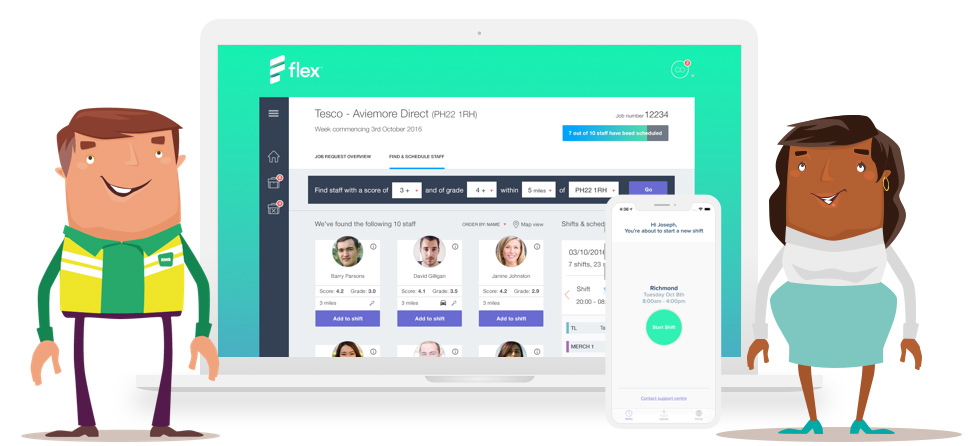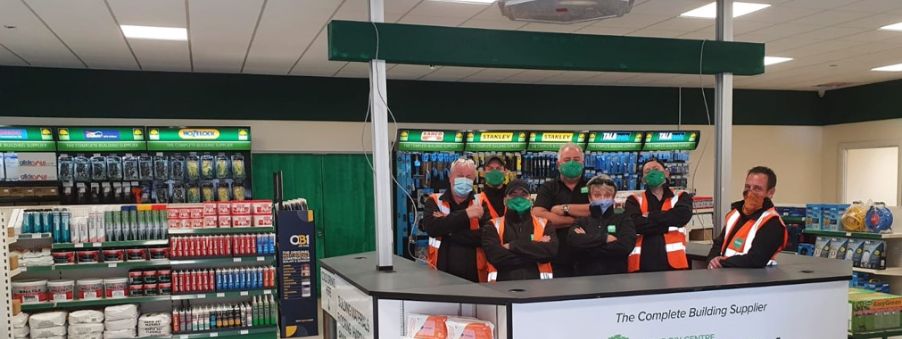For retailers, the ability to scale up their teams to tackle large, complex projects is essential. Whether it’s a nationwide category change, an intensive store refit programme or a large-scale merchandising campaign, the project will need people, often at short notice. As well as the recruitment of those people, they also need to be trained and managed effectively to ensure that the project is delivered successfully.
In this article, James Davies, our Business Development Manager, identifies the three key challenges that retailers who need to scale up face. He also explains how we at RMS manage those challenges in order to deliver projects successfully for our retail partners.
Recruiting the Right People
When it goes wrong, scaling up can amplify the bad and make the good more difficult. The key question is how to scale a team successfully, and why is it so difficult to do it?
James says: “At RMS, we specialise in providing highly trained, flexible workers and, over the past number of years, we’ve been building up a nationwide workforce of retail merchandisers, stock replenishers and order pickers across both the UK and Ireland. We call them ‘flexers’ as they are able to work across multiple brands, and be available when and where they are needed”.
Recruiting staff can be a costly and time-consuming process. James explains how RMS handles this essential part of the operation: “We employ experienced in-house recruiters who take this burden away from our retail partners. Our recruiters are able to vet the candidates to ensure that we only provide the right type of person in terms of skills, experience and most importantly, their attitude”.
RMS also invests in training and professional development of staff to ensure that they deliver a high level of service. “When a client requests our services”, James says, “we can deploy people quickly to specific locations throughout the UK and Ireland. Our flexible workforce is proactive, mobile, and adaptable. RMS merchandisers work across a range of retail brands, and they integrate well with in-store teams. It is how we’ve been able to take on huge projects over the last few years, including supporting Tesco during the Festive periods (link to case study), and most recently carrying out an important merchandising programme for Well Pharmacy, among other similar big-scale projects”.

James Davies, our Business Development Manager
Communicating with Staff
When the number of people in a project increases, so does the number of communication channels and challenges. If the communication channels aren’t good enough to begin with, then scaling up will exacerbate the problem. If your teams aren’t managed effectively, it could lead to project failure. If the communication channels are good, scaling up will introduce some challenges due not only to the increased number of people, but also due to their distribution. There will be extra teams in more locations, forcing changes in the communication channels.
James explains how the RMS communication channels work: “Despite our people being spread across the UK and Ireland, and the challenges of COVID-19, which has led to our head office teams working from home, our ability to communicate effectively with our people in the field has been unaffected, due to flex™. Developed over a number of years, flex™ is our resource scheduling and management system that intelligently builds, manages, and schedules teams of flexible staff, deploying them to wherever our retail partners need them. It also allows both our head office team and our field staff to communicate with each other”.
James believes it is the power of flex™ that sets RMS apart from the competition. He says: “The myflex smartphone app allows us to publish company updates on the blog, and senior management can send out SMS messages to either the entire workforce, or a specific team. Therefore, when we are working on large and complex projects for our retail partners, our sophisticated communication channels mean that although our workforce is spread out, in fact it remains wholly connected”.
“Our merchandisers and retail support staff check-in and out of their shifts using the myflex app, which utilises location services to ensure accuracy. The flex™ technology also allows team members to contact each other, and also to get in touch with a member of head office, so no matter how remote someone may be, they always have the ability to connect with someone else from the company”.
“Illness and staff drop-outs are unavoidable in any business, and RMS is no exception”, states James, “but the use of flex™ allows us to easily overcome this challenge”. If a member of staff drops out of a shift, the scheduling team sends an open job invite to every staff member who is available and within a reasonable range of the retail store, and our flexers use the myflex app to respond. It allows for incomplete teams to be filled quickly and effortlessly with experienced people, meaning that the shift is completed with the resource that the client originally requested.
Tracking a Project’s Progress
Keeping track of large projects, especially if they encompass many stores and dozens of teams of workers, is a huge challenge. For those businesses who don’t have the infrastructure in place to oversee large, complex projects, it can lead to all sorts of problems.
Following on from his previous point, James believes that “it is our technology, flex™, that allows us to follow the progress of a particular project, from the pre-planning stage all the way to post-completion. All data available on a project is recorded within the system, with each of our retail partners given access to their own branded ‘partner portal’. This allows them to remotely track the progress of their projects and to make changes or corrections to the project before they turn into issues”.
All data is updated in real-time, and the retail partners see everything that the RMS management team sees. “As a family-owned business”, says James, “we are truly committed to 100% honesty and transparency because this delivers the best results, while also serving to strengthen our relationships with the retailers we work with”.
Access to a partner portal means that as well as being to drill down into the details of their project and check that everything is being completed as per their request, the retail partners can easily communicate with members of the RMS project management team. The retailers who work with RMS benefit from the skills and experience of the field team, safe in the knowledge that they can reach out to senior members of staff if they need to raise an issue.

Paving the Path to Project Success
Taking on large projects naturally comes with several issues that must be overcome in order to achieve success. The ability to scale up staff numbers with skilled, experienced people is probably the biggest obstacle facing those retailers with ambitious projects, and developing a flexible workforce, as well as the infrastructure to manage them, isn’t something that can be done overnight. Alongside recruiting more people, the completion of large retail projects relies on effective communication channels and complete transparency, so that everyone involved knows what is expected of them and problems can be solved as soon as they arise. With these 3 key elements in place, it will pave the path to success.
RMS is one of the UK and Ireland’s leading providers of merchandising and retail support services. The combination of our nationwide workforce of skilled ‘flexers’ and our technology, flex™, places us in an ideal position to support new and current retail partners with scaling up for large and complex projects.
